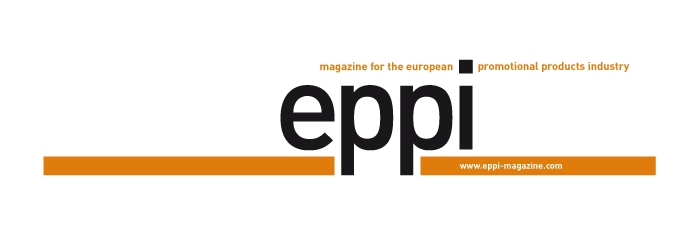Fair trade seals like the signet of Fairtrade International or the logo of the World Fair Trade Organisation enjoy a high degree of trust among the consumers. Fair trade products are also increasingly establishing themselves in the promotional products sector. This is not surprising since they combine true commitment with quality and individuality.
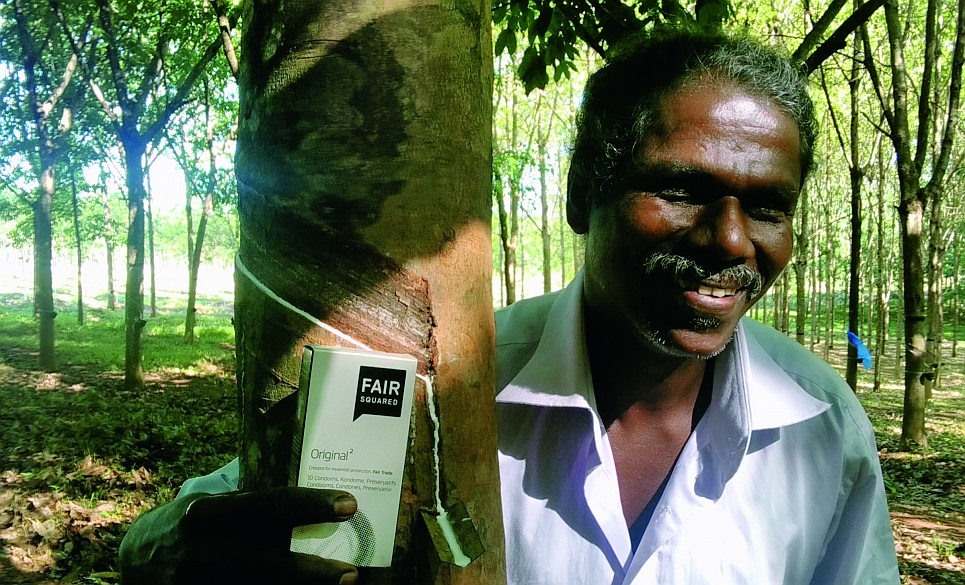
Fair Squared stands for condoms made out of fairly traded latex as well as a cosmetic series that carries the Fairtrade label.
For consumers, who want to purchase conscientiously, walking through the supermarket aisles has in the meantime become a trip through the seal jungle. Dozens of labels attest, some more credibly than others, the harmlessness of the goods in question. Hardly anyone knows every seal, let alone the related contents. This results in a sense of insecurity. One of the seals that has succeeded in not only attaining wide-scale recognition, but also trust, is the Fairtrade seal. In less than 15 years, the label that was launched in 2002 (see box for information) has advanced into becoming one of the world’s most famous social labels: In a survey on behalf of Fairtrade International that was carried out among 10,000 consumers in 17 countries in 2013, 56% of the respondents stated that they knew the Fairtrade label. In five leading markets the recognition level was indeed in each case around 90%. As such, Fairtrade International has succeeded in achieving something that other social initiatives struggle to do: To subsume and market a complex system under a seal that enjoys international and public recognition. Fairtrade manufacturers have to fulfil a detailed catalogue of demands. “We start with the production and harvesting of the raw materials. The aim is to reward small farmers for their sustainable production and enable them to earn a good living from their work. A further obligatory element is a premium that is paid on top – for education, preventative healthcare and infrastructure projects. Work protection, standards against child labour, but also ecological components like dispensing with pesticides are further basic requisites,” explained Kristin Rademacher, Senior Key Account & Product Manager at Transfair, the non-profit making association, which awards the Fairtrade seal on the German market. All importers, manufacturers or brand owners, who want to import Fairtrade products to Germany, have to contact Transfair and sign licensing agreements.
In this way, the continuation of the system is not least secured. The awarding of the seal is organised in a similar way in all international markets in which Fairtrade products are available. According to the Annual and Effectiveness Report 2014/15, in the meantime more than 1.5 mil. farmers and workers benefit from the Fairtrade system worldwide. Together they form 1,210 manufacturing organisations in 74 countries. 80% of them are organised in small farmer cooperatives. 360 raw materials can be currently traded according to the Fairtrade standards. As such, the consumers no longer only have the opportunity to make alternative purchasing decisions in the original Fairtrade domains of coffee, bananas, cocoa or flowers, but also for sweets, cosmetics or jewellery. Worldwide 5.9 bil. Euros were turned over in 2014 with Fairtrade products, which corresponds to a 10% increase compared to 2013. In this way, premiums to the value of 105 bil. Euros were paid to the Fairtrade producers.
Fair haptic advertising
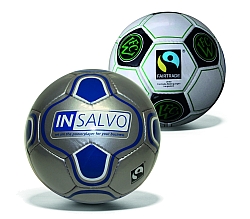
Paol Austria offers small volumes of
individualised Fairtrade footballs.
In the light of the high recognition level and acceptance of the Fairtrade seal it is thus not surprising that Fairtrade products are also finding their way more and more often onto the promotional products market. “A sustainable corporate strategy also demands the corresponding promotional products. The future trend is clearly moving in the direction of products that are strictly produced in a sustainable manner,” stated Mark Zechiel, CEO of Paol Austria. The company is a Fairtrade license holder and specialises in fair footballs – a product segment, where trends from the retail sector rub off on the promotional products industry, as Zechiel reported: “The demand for Fairtrade-certified promotional footballs has increased sharply over the past few years. The customers want to know under what conditions the balls are produced. The brand Fairtrade is a quality seal and guarantees fair prices so that all of the companies involved in the value chain can make a sustainable living from their work.” “Especially big companies that introduce the appropriate standards also apply these to their promotion measures. Products that carry a Fairtrade seal not only offer serious certified safety, they also have a strong external impact on the recipient,” added Oliver Gothe, CEO of Fair Squared. Since 2014, the company that was founded in Great Britain in 2009 has been offering one of the first face care series on the European market that carries the Fairtrade seal and also supplies condoms that carry the Fair Rubber seal. Fair Squared works together with a fixed pool of production partners and sources Shea butter for instance from Burkina Faso, coconut oil, green tea and natural rubber latex from India or almond and apricot oil from Pakistan. “First of all, we search for manufacturers via the FLO network and then check the quality of their goods – they have to allow good processing,” commented Gothe. “It is not always easy to find producers. Whereas there is a large selection for some raw materials, it was for example extremely difficult to find a supplier for Argan oil, who is not only a member of the Fairtrade network, but who can also offer organic quality.” In the meantime, the company offers around 40 different items from the beauty & health sector, whereby the collection is tailored to meet the needs of the promotional products market. “The customers have the choice between different packaging – from sachets and tubes through to jars, bottles and lip containers, all of which come in various sizes,” explained Gothe. “Regarding the design, we offer all possible printing options, whereby the logos of the certificates have to be remain visible of course.”
“Commercial Empowerment”
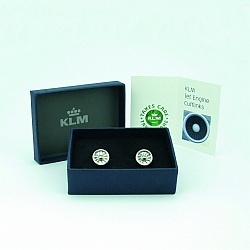
All of tuyu’s products are custom-made designs, p.e. cufflinks for the airline KLM.
The Dutch company, tuyu, also specialises in fair promotional products. However, tuyu does not work together with Fairtrade International, but with the World Fair Trade Organisation (WTFO – see box for information). Unlike Fairtrade International, the WTFO mainly concentrates on hand crafted products and food produced in small quantities and focuses on certifying companies as a whole. The WFTO certification system was amongst other things developed because the Fairtrade International System is only defined for certain product groups and only involves commodity producers. Since product standards are technically difficult to define and implement in the handicraft sector due to the diversity and complexity, the WFTO system aims at offering an alternative. tuyu is by own accounts one of the ten “Guaranteed Fair Trade” WFTO members certified in Europe and is therefore allowed to place the WFTO label and the addendum “Guaranteed Fair Trade” on its products. The company brings together small manufacturers in developing countries with companies, who are looking for exclusive and customised haptic brand ambassadors instead of interchangeable standard goods.
“I founded tuyu in 2003 and initially advised fair trade manufacturers about the marketing of their products on behalf of NGOs and the Dutch Ministry of Economic Affairs,” explained the CEO Antoinette Gast, who was previously employed in the consulting and marketing business. “Based on the principle that the best adviser is the customer himself, I began to focus on fairly traded promotional products in 2008. It is proven that sustainable promotional products have a higher advertising impact, because the recipient evaluates them much more positively.” On the other hand, tuyu helps the manufacturers to access the sales market, which they otherwise wouldn’t necessarily be able to gain a foothold on and in the sense of a “Commercial Empowerment” it gives them the opportunity to develop and professionalise their sales channels in line with the market requirements. tuyu doesn’t offer any standard goods, it exclusively supplies custom-made designs. For example, the approx. ten partners of the company include a soapstone workshop in India, a textile factory in Mauritius – which is additionally Fairtrade and GOTS certified –, a wood manufacturing company in Thailand, a paper cooperative in Nepal, a producer of alpaca wool in Peru and a leather manufacturer in Bangladesh. In close collaboration with the contractors and manufacturers, cufflinks were produced for the airline KLM, hand-knitted hats for the hotel chain Stayokay, jewellery made of glass beads for the Dutch National Park De Hoge Veluwe and business card holders for the alumni of the International Institute of Social Studies (ISS) at the Erasmus University Rotterdam. tuyu always strives to strengthen and further develop the supply chains. “Almost every cooperation leads to new ideas and new opportunities of how the producers can further develop,” reported Gast. “We don’t go ‘shopping’, instead we always try to realise further projects together with a producer. The result has been that we have built up a fixed pool of partners over the years, to whom we maintain close relationships and whom we also visit regularly.” Fair Squared follows a similar strategy. “Longterm, personal relations are part of the Fairtrade concept. We maintain close personal contact to all of our manufacturers and strive to assert ourselves far beyond the required measures.”
Strict criteria
Measures that are already very comprehensive and which are strictly adhered to: “FLO-CERT is the strictest and safest of all the systems,” said Gothe. “We are committed to transparency and are subject to audits annually. The audits serve to check that all of the criteria are complied with. The result is an unbroken chain from the plantation through to us.” The criticism that is sometimes expressed that some Fairtrade products are deceptive rip-offs that only partly comprise of fairly traded contents, can be invalidated on closer inspection because there is a precise set of rules for so-called mixed products from the food or cosmetic industries for instance. Chocolate, for example, contains ingredients such as milk powder for which there are no Fairtrade standards. All contents that are available as a Fairtrade-certified raw material – such as i.e. cocoa butter, cocoa powder and sugar – have to have been traded in compliance with the Fairtrade standard. “The rule that applies is ‘All that can be, must be’,” explained Rademacher. “On top of this regulation, there is a further criterion that the Fairtrade ingredients have to make up at least 20% of the overall product. Whereby, in the case of milk chocolate the Fairtrade share is always around 70%.” The Fairtrade regulations also take possible raw material bottle necks into account, as Gothe explained: “If for example the harvest was poor and the available reserves are ‘depleted’ – for instance in our case this happened last year with apricot oil – it is permitted to buy from producers that are not Fairtrade-certified on a short-term basis. However, the Fairtrade price still has to be paid.” The manufacturers of the products are obliged to precisely communicate the share of Fairtrade ingredients in the ingredients list on the packaging.
High quality
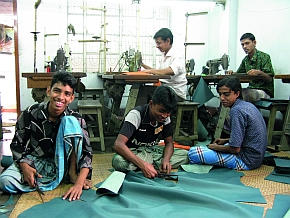
Among others, tuyu works together with a leather workshop in Bangladesh.
Companies that have opted for a Fairtrade product can not only rely on guaranteed safety, but also on good quality, because many of the raw materials and products are produced by small farming cooperatives and craft businesses. “In general, the quality offered by the manufacturers that are part of the Fairtrade network is very high,” confirmed Gothe. “Most of the raw materials are not grown under industrial conditions and in some cases are harvested by hand. Pesticides are rarely used either. Around 70% of the plantations that we work together with are also FSC-certified – here several sustainability concepts intermesh and this is precisely the aim.” The same applies for the production shops that cooperate with the WFTO. “In some cases certain prejudices are still associated to fair products – even though our producers are totally competitive in terms of quality and satisfy the highest demands,” stated Gast. “The delivery times are in line with the normal market conditions too because most of our producers are geared up for large volumes. It only sometimes takes longer in very special cases – i.e. soapstone products made by hand.” All of this at prices that are not only fair, but also in line with the market and in terms of the quality and value for money of the products they are totally competitive as well. “Fairtrade products are not too expensive for anyone who wants a unique high-quality product and who is looking for quality rather than quantity. Especially since they offer a high return on investment,” said Gast. “Fairtrade-certified balls cost around 20% more, because the workers verifiably earn more,” said Zechiel, whose company works together with two production partners in Pakistan. “However, ours are still cheaper than footballs made by other big brand manufacturers and team sports equipment manufacturers such as Adidas, Puma or Nike, because our structures are more streamlined and we don’t have such big overhead costs.” Gothe added: “Cosmetics made of fairly traded ingredients are 10% to 15% more expensive depending on the volume – that isn’t very much when one considers that the prices of the raw materials are in some cases 10% to 30% higher than the global market price. Condoms made of fairly traded latex are in some cases cheaper than brand products.”
Whereby in the meantime the market offers promoting companies from all industries and market segments the opportunity to purchase fairly trade goods. Zechiel: “Whereas over the past years it was predominantly big companies who took social and ecological aspects into account when procuring items, more and more mediumsized and small companies are jumping on the band wagon today. We offer Fairtrade footballs in the customer’s CI for minimum orders of just 50 pieces – this allows small companies and football clubs to support the Fairtrade approach.” Transfair also offers customers from the B2B sector low threshold access to the world of “fair promotion”: “We are happy to bring promotional products distributors, who want to include Fairtrade products in their line-ups, together with our suppliers free of charge – that is part of our service,” commented Rademacher. “The packaging of the products is approved by us with a blank surface for the customisations which can be imprinted to suit the customer’s requirements.”
Overall financial and logistic efforts that are compensated for in many ways, because companies that implement fair products as promotional products benefit from a considerable image gain. Whereas everyone on the management floors is talking about sustainability and a lot of time and money is invested in the corresponding campaigns, Fairtrade and WFTO certified products stand for real commitment as opposed to greenwashing. Numerous independent surveys that are available both on the Fairtrade and on the WFTO website, underline the seriousness and effectiveness of the systems. Reports from the production sites, where the cooperation has led to considerable improvements in the economic framework conditions and living standards tell a different kind of success story. The seals lend brands something that brand communication is always striving to achieve, namely credibility and emotionality – and they are not only a true orientation for the consumers in the label jungle, but also for the promoting companies.
Info: Fairtrade International
Fair trade initiatives and associations came into being in the second half of the 20th Century. In 1997, 17 seal initiatives founded Fairtrade Labelling Organizations International (FLO) as a joint umbrella organisation in order to harmonise the standards and processes. In 2002, FLO introduced the common Fairtrade seal. Since 2011, FLO has been operating as Fairtrade International. At the moment, 25 national organisations, who are members of the umbrella organisation, market the Fairtrade label in their respective country. Fairtrade International is based in Bonn and develops the internationally applicable standards for the certification. The independent subsidiary organisation, FLO-CERT, which was founded in 2004, checks the compliance of these standards. Companies that want to launch the Fairtrade products onto a market have to contact the responsible seal organisation.
www.fairtrade.net
Info: WFTO
In 2009, the World Fair Trade Organisation (WFTO) arose from the International Federation of Alternative Trade (IFAT), which was founded in 1989. At the end of 2014, the WFTO had 359 members and 46 individual partners in 79 countries. The WFTO standard comprises of ten principles, which all of the member organisations have to comply with, including for example the creation of opportunities for economically disadvantaged manufacturers, partnership-like trading practices, the payment of fair prices, a ban on exploitative child labour and forced labour or environmental protection. The standard defines a row of criteria for each principle. The WFTO guarantee system aims to secure the observance of the criteria. Those companies that carry the WFTO seal, fulfil the ten principles for fair trade. Thus, contrary to the Fairtrade seal, the WFTO seal is not a product seal, but instead concentrates on processes.
photos: Fair Squared; Paol Austria; tuyu (2)


